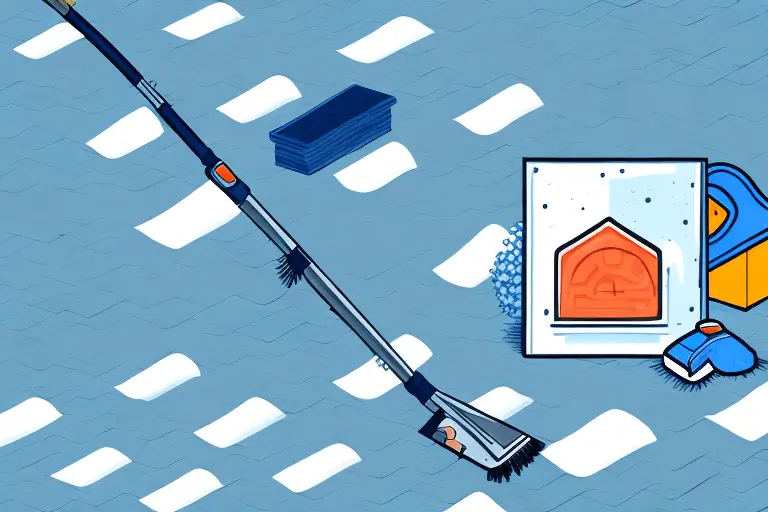If you’re looking to start a new business venture, the roof cleaning industry could be an attractive option. In recent years, the demand for roof cleaning services has continued to grow as homeowners and commercial property owners become more conscious of the importance of maintaining their roofs. In this comprehensive guide, we’ll cover all the information you’ll need if you’re wondering how to start a roof cleaning business in the UK.
Understanding the Roof Cleaning Industry
The demand for roof cleaning services
Roof cleaning services are becoming increasingly popular, as people are becoming more aware of the importance of maintaining a clean and healthy roof. A clean roof not only enhances the aesthetic appeal of a property but also helps to prevent damage caused by moss, algae, and lichen growth. With roofs being exposed to weather elements such as UV rays, rain, wind, and snow, they require regular cleaning to ensure they remain in good condition.
Moreover, a dirty roof can lead to clogged gutters, which can cause water damage to the interior of a property. Homeowners and commercial property owners often opt for professional cleaning services because DIY cleaning can be dangerous and time-consuming. Professional cleaners have the necessary equipment and expertise to clean roofs safely and efficiently.
Common roof cleaning techniques and equipment
There are several techniques and methods for cleaning roofs, and each technique has its advantages and disadvantages. Pressure washing involves using pressurised water to remove dirt and grime from the roof’s surface. While it is an effective method for removing stubborn stains, it can also damage the roof tiles or shingles if not used correctly.
Soft washing is a gentler approach that uses low pressure and a specialised cleaning solution to avoid damage. This method is ideal for delicate roof materials such as slate or tile. Chemical application involves applying a cleaning solution to the roof tiles or shingles and allowing the chemicals to work their way through the dirt before being rinsed off. This method is effective in removing moss, algae, and lichen growth.
Professional roof cleaners use specialised equipment such as pressure washers, cleaning solutions, and safety equipment. The equipment can be expensive, but it is crucial to providing quality service. Safety equipment such as harnesses and safety ropes are necessary to ensure the safety of the cleaners while working on the roof.
Challenges and opportunities in the industry
Like any new business venture, there will be challenges and opportunities in the roof cleaning industry. One of the biggest challenges may be establishing a customer base and differentiating yourself from competitors. However, there are opportunities for growth and expansion by offering additional services such as gutter cleaning or roof repair. By staying up-to-date with the latest equipment and techniques, you can provide your customers with the best possible service and stay ahead of the competition.
Another challenge in the industry is the environmental impact of the cleaning solutions used. Some cleaning solutions contain harsh chemicals that can harm the environment. To address this issue, some companies have started using eco-friendly cleaning solutions that are safe for the environment. By using eco-friendly solutions, you can attract customers who are environmentally conscious.
In conclusion, the roof cleaning industry is growing, and there are opportunities for growth and expansion. By providing quality service, staying up-to-date with the latest equipment and techniques, and addressing environmental concerns, you can establish a successful and profitable business.
Creating a Business Plan for Your Roof Cleaning Business
Starting a roof cleaning business can be a lucrative and rewarding venture. However, like any business, it requires careful planning and execution to be successful. In this guide, we will explore the key elements of creating a business plan for your roof cleaning business.
Defining Your Target Market
Identifying your target market is a critical step in starting your roof cleaning business. This will help you understand the types of properties and customers you want to work with and what services they require. For example, targeting residential areas in a specific neighbourhood could be a cost-effective way to begin establishing your customer base. You could also offer your services to commercial properties or property management companies, often providing a reliable source of repeat business.To further define your target market, consider factors such as income level, property age, and location. These details will help you tailor your services to meet the specific needs of your customers.
Setting Your Pricing Strategy
Setting a competitive and profitable pricing strategy is crucial when starting a business. You will need to research the costs of materials, equipment, and labor to determine your pricing. Consider how you will differentiate your pricing from competitors to attract new customers while still remaining profitable. Offering discounts or specials for first-time customers could also be a successful marketing tactic. To ensure your pricing strategy remains profitable, it’s important to continually monitor and adjust your prices as needed. This will help you stay competitive in the market while still earning a profit.
Outlining Your Marketing and Advertising Plan
Marketing and advertising are crucial elements of any successful business, and roof cleaning is no exception. Look at ways to promote your business such as a website with detailed information about your services, social media presence, and flyers in your neighbourhood advertising your business. You may also want to consider attending local trade shows and events to network and increase your visibility. In addition to these tactics, consider offering referral incentives to current customers. Word of mouth is a powerful marketing tool and can be a cost-effective way to attract new customers.
Projecting Financials and Growth Potential
Finally, projecting your financials is important to understand the potential growth of your business. You should consider your current finances, projected earnings, and expenses to plan for the future. Keep track of expenses such as purchasing equipment, advertising costs, and labour expenses to ensure that your business is remaining profitable.
Identifying potential weaknesses, strengths, and opportunities within the market will give you a clear understanding of your business’s profit-making potential. As your business grows, consider expanding your services to include other exterior cleaning and maintenance services. This will help you increase your revenue streams and establish yourself as a one-stop shop for property owners.
Starting a roof cleaning business requires careful planning and execution. By defining your target market, setting a pricing strategy, outlining your marketing and advertising plan, and projecting your financials, you can create a solid foundation for a successful business.
Legal Requirements and Regulations
Starting a business can be a daunting task, especially when it comes to understanding the legal requirements and regulations that come with it. Here are some additional details to consider when registering and operating a roof cleaning business:
Registering your business
Before you can start operating your roof cleaning business, you need to register it with HM Revenue and Customs. This involves filling out specific documentation and providing information about your business structure and operations. It’s important to note that registering as a sole trader or limited company requires annual renewal, so make sure you keep track of these deadlines to avoid any penalties.
In addition to registering with HM Revenue and Customs, you may also need to register with other government bodies depending on the nature of your business. For example, if you plan on using chemicals in your cleaning process, you may need to register with the Health and Safety Executive (HSE) or the Environment Agency.
Obtaining necessary permits and licenses
Roof cleaning businesses may require specific permits and licenses from local councils or authorities. These can include permits for using high-pressure equipment, permits for disposing of waste, and public liability insurance. It’s important to research local regulations and ensure you have the necessary licenses before starting operations.
When it comes to waste disposal, it’s important to consider the environmental impact of your business. You may want to explore eco-friendly options such as using biodegradable cleaning products or recycling waste materials.
Insurance considerations
Insurance is a crucial aspect of any business, and roof cleaning is no exception. Public liability insurance will protect you in the event of any accidents or damages that occur while you’re working on a client’s property. Employer’s liability insurance is also important if you plan on hiring employees, as it will cover any injuries they sustain while working for you.
In addition to these types of insurance, you may also want to consider a professional indemnity policy. This will protect you in the event of any professional damages or errors, such as accidentally damaging a client’s roof or failing to complete a job to their satisfaction.
Health and safety regulations
When it comes to operating a roof cleaning business, maintaining health and safety regulations is paramount. This involves ensuring that you and your employees are trained in using specialized equipment and are equipped with protective gear to prevent injury. Regular equipment checks and risk assessments should also be completed to ensure you are meeting your health and safety obligations.
It’s also important to consider the safety of your clients and their property. Make sure you take steps to protect their property from damage during the cleaning process, such as covering nearby plants or furniture. Communicate with your clients about any potential hazards or risks associated with the cleaning process, and make sure they understand what to expect.
By taking the time to understand and comply with legal requirements and regulations, you can ensure that your roof cleaning business operates smoothly and successfully.
Purchasing and Maintaining Equipment
Essential roof cleaning tools and equipment
Purchasing essential equipment will be an investment that pays off in the long run. This includes pressure washers, cleaning solutions, protective gear, ladders, and transport vehicles. Make sure your equipment is of high quality, reliable, and fit for purpose. Purchasing second-hand equipment may be a cost-effective alternative to buying new equipment.
Vehicle and transportation considerations
A reliable vehicle is important for the transportation of equipment and employees. Consider purchasing a van or truck that can handle the weight and size of your equipment. Ensure your vehicle goes for regular maintenance and safety checks to minimise risk.
Equipment maintenance and replacement
Maintaining and repairing equipment regularly is imperative to avoid breakdowns and to maintain the safety of your employees. Set up a regular maintenance schedule for your equipment and replace any damaged equipment as soon as possible. This will save on downtime and potential financial losses in the future.
Conclusion
Starting a roof cleaning business in the UK may seem daunting, but with a clear business plan, an understanding of the industry, and proper financial and legal considerations, it can be a lucrative opportunity. Offering quality service, investing in high-quality equipment, and maintaining safety regulations are crucial to the long-term success of your business. With continued hard work and dedication, your business can grow and thrive in the competitive roof cleaning industry.


